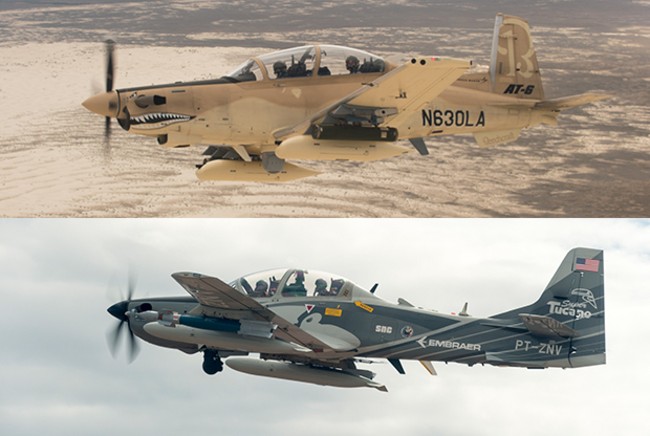The Air Force is moving ahead with contracts for both finalists involved in its exploration of light-attack aircraft, issuing awards to both Textron’s AT-6 and Sierra Nevada Corp.’s A-29 over the past few weeks.
Formal funding is the latest step in the Air Force’s light-attack experiment that began in 2017, though it falls short of the large-scale procurement that some want.
Textron announced March 16 it will use $70.2 million from the Air Force to provide two AT-6 Wolverines, a variant of a Beechcraft trainer aircraft, along with training, engineering services, and contractor support. The Wolverine will help prove out the Airborne Extensible Relay Over-Horizon Network (AEROnet), the service’s prototype data-sharing network.
“The AT-6 is a vital element of the National Defense Strategy to build ally and partner capacity, capability, and interoperability—and does so at a fraction of the cost of other combat aircraft,” Brett Pierson, Textron’s vice president of defense strategy and sales, said in a release. “We’re eager to deliver the aircraft to the Air Force in support of Air Combat Command’s development of operational tactics and standards for exportable, tactical networks that improve interoperability with international partners.”
Nellis Air Force Base, Nev., plans to use the AT-6 for additional light-attack experiments with the Marine Corps and partner countries. Those tests will “further examine the ways in which a common architecture and intelligence-sharing network will connect platforms, sensors, and weapons and deliver a digital network for light attack aircraft.”
AEROnet is a fledgling air-to-air and air-to-ground radio system that would let the U.S. and foreign militaries share video, voice, and chat communications as well as command and control via tablets, smartphones, and mobile apps for less than $500,000. The Air Force developed it alongside the light-attack experiment so that all nations who participate in that program or own a close air support platform could share information more easily.
Sierra Nevada also said March 3 it received a preliminary contract for the A-29 Super Tucano and related services to support Air Force Special Operations Command’s foreign advisory mission. The company earned an award worth up to approximately $129 million for two aircraft, which it provides with Embraer Defense and Security, the Pentagon said Feb. 26.
“The U.S. Air Force will now have the opportunity to deploy the A-29 in support of U.S. and allied operations,” Mark Williams, a vice president of aviation strategic plans and programs at SNC, said in a release. “This acquisition provides long-overdue capabilities to the warfighter and best value to the U.S. taxpayer.”
Airmen will get the A-29s in 2021 and use them to train foreign militaries through 2024.
In the meantime, U.S. Special Operations Command wants to move forward with its own plan to buy 75 armed overwatch planes, piggybacking on the Air Force’s effort.
